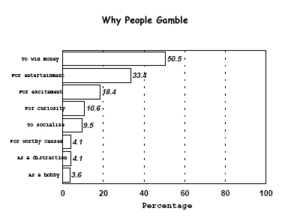The WAGER, Vol. 3(11) – Why people gamble
Surveys conducted since 1974 consistently reveal that the majority of Americans have gambled in their lifetimes. Increased opportunities to gamble is certainly one of the reasons for the increased lifetime prevalence of gambling. A 1993 random telephone survey of 1522 adults across the U.S. questioned respondents about their motivation to gamble [1]. Respondents were given a list of reasons to choose from, and were permitted to choose as many reasons as they found applicable. Of the 937 (61.6%) adults who had gambled in the past 12 months, the most frequently reported reason for gambling was “to win money.” The next most commonly reported reason was “for entertainment”. Most individuals likely would not continue to gamble unless they found it entertaining; gambling often brings a psychological rush which contributes to the subjective experience of being entertained. However, it is the nature of gambling that most gamblers do not “win money”. Thus, of the 50.5% of respondents who gamble to win money, very few of them realize this desired goal in the long run. Thompson points out some of the potentially positive consequences of gambling [2]: although it rarely offers financial benefits, gambling often takes place in a social setting and represents an opportunity to spend time with friends, it contributes to community dialogue, and can give some players a fleeting illusion of self-control. Despite these potentially positive consequences, gambling is also associated with negative consequences for a percentage of the population, including negative legal, financial, social, psychological and health consequences. While most gamblers gamble to win money and for entertainment, it is possible that pathological gamblers gamble for the same or for entirely different reasons. The reasons people gamble the first time may also differ from the reason they continue to gamble.
Sources:
1. Mississippi State University Gambling Group. (1995). National gambling survey. Starkville, MS: MSU Social Sciences Research Center;
2. Thompson, W.N. (1997). Legalized gambling. Second edition. Santa Barbara, CA: ABC-Clio, Inc.
